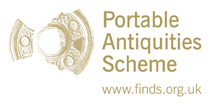File:Medieval laver or ewer spout (front and back views) (FindID 142713).jpg
From Wikimedia Commons, the free media repository
Jump to navigation
Jump to search

Size of this preview: 800 × 368 pixels. Other resolutions: 320 × 147 pixels | 640 × 294 pixels | 1,024 × 470 pixels | 2,020 × 928 pixels.
Original file (2,020 × 928 pixels, file size: 133 KB, MIME type: image/jpeg)
File information
Structured data
Captions
Captions
Add a one-line explanation of what this file represents
Summary
[edit]| Medieval laver or ewer spout (front and back views) | |||
|---|---|---|---|
| Photographer |
Birmingham Museums Trust, Caroline Johnson, 2006-11-14 12:13:12 |
||
| Title |
Medieval laver or ewer spout (front and back views) |
||
| Description |
English: A complete cast copper alloy zoomorphic decorative pouring spout or laver, probably from an ewer and dating to the 15th century AD (length: approx 60mm; width: 47.5mm; thickness: 16mm; weight: 46.1g). This artefact has an integrally cast angular dog’s head terminal with a tubular spout extending out from the dog’s open lozenge-shaped mouth (internal diameter of spout: 5.5mm). The dog’s head has strongly pronounced ridges/ protrusions for the facial features, including rectangular ears to either side of the head and heavy ridged eyebrows. The eyes are not illustrated. The spout has a short neck before curving downwards to the hollow opening at the back. The back of the artefact, which would have been attached to the vessel, is undecorated and curved to a pointed terminal, with a slanted indentation continuing to a hollow circular opening at the top, which then leads to the front of the spout. The artefact is in a worn but fair condition with a dark green patina. Similar examples can be seen recorded with the Portable Antiquities Scheme (record numbers WMID-FFD0E2, WMID-BE4B04 & WMID-AE1396) and are illustrated in Mill’s ‘Medieval Artefacts’, 1999, page 110, ref NM 292, and they are described as being from a laver or priest’s washing bowl. A ewer with a similar spout is also shown in J.M. Lewis's paper 'Bronze Aquamaniles and Ewers' (1987: Finds Research Group Datasheet 7, pp 4-5 fig 8a). This example is from a later pedestal-base ewer discovered in the moat at Cardiff Castle and dated to the 15th century. |
||
| Depicted place | (County of findspot) Staffordshire | ||
| Date |
between 1400 and 1500 date QS:P571,+1500-00-00T00:00:00Z/6,P1319,+1400-00-00T00:00:00Z/9,P1326,+1500-00-00T00:00:00Z/9 |
||
| Accession number |
FindID: 142713 Old ref: WMID-9748E6 Filename: WMID-9748E6.jpg |
||
| Credit line |
|
||
| Source |
https://finds.org.uk/database/ajax/download/id/120474 Catalog: https://finds.org.uk/database/images/image/id/120474/recordtype/artefacts archive copy at the Wayback Machine Artefact: https://finds.org.uk/database/artefacts/record/id/142713 |
||
| Permission (Reusing this file) |
Attribution-ShareAlike License | ||
Licensing
[edit]This file is licensed under the Creative Commons Attribution-Share Alike 2.0 Generic license.
Attribution: The Portable Antiquities Scheme/ The Trustees of the British Museum
- You are free:
- to share – to copy, distribute and transmit the work
- to remix – to adapt the work
- Under the following conditions:
- attribution – You must give appropriate credit, provide a link to the license, and indicate if changes were made. You may do so in any reasonable manner, but not in any way that suggests the licensor endorses you or your use.
- share alike – If you remix, transform, or build upon the material, you must distribute your contributions under the same or compatible license as the original.
File history
Click on a date/time to view the file as it appeared at that time.
| Date/Time | Thumbnail | Dimensions | User | Comment | |
|---|---|---|---|---|---|
| current | 23:10, 6 February 2017 |  | 2,020 × 928 (133 KB) | Fæ (talk | contribs) | Portable Antiquities Scheme, WMID, FindID: 142713, medieval, page 6563, batch sort-updated count 78419 |
You cannot overwrite this file.
File usage on Commons
The following page uses this file:
Metadata
This file contains additional information such as Exif metadata which may have been added by the digital camera, scanner, or software program used to create or digitize it. If the file has been modified from its original state, some details such as the timestamp may not fully reflect those of the original file. The timestamp is only as accurate as the clock in the camera, and it may be completely wrong.
| Camera manufacturer | NIKON |
|---|---|
| Camera model | E4500 |
| Exposure time | 10/603 sec (0.016583747927032) |
| F-number | f/3.8 |
| ISO speed rating | 100 |
| Date and time of data generation | Unknown date |
| Lens focal length | 19.5 mm |
| Orientation | Normal |
| Horizontal resolution | 300 dpi |
| Vertical resolution | 300 dpi |
| Software used | E4500v1.2 |
| File change date and time | Unknown date |
| Y and C positioning | Co-sited |
| Exposure Program | Normal program |
| Exif version | 2.2 |
| Date and time of digitizing | Unknown date |
| Meaning of each component |
|
| Image compression mode | 4 |
| APEX exposure bias | 0 |
| Maximum land aperture | 2.8 APEX (f/2.64) |
| Metering mode | Pattern |
| Light source | Unknown |
| Flash | Flash fired, auto mode |
| Supported Flashpix version | 1 |
| Color space | sRGB |
| File source | Digital still camera |
| Scene type | A directly photographed image |
| Custom image processing | Normal process |
| Exposure mode | Auto exposure |
| White balance | Auto white balance |
| Digital zoom ratio | 0 |
| Focal length in 35 mm film | 94 mm |
| Scene capture type | Standard |
| Scene control | None |
| Contrast | Normal |
| Saturation | Normal |
| Sharpness | Normal |
| Subject distance range | Unknown |
